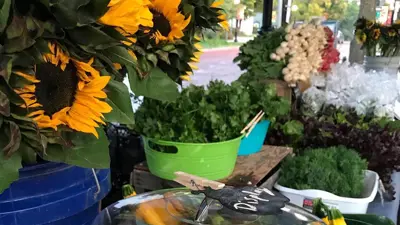Welcome
Garbage, refuse, trash, waste... these are all different names for the stuff we may no longer want or use. There are plenty of options for what to do with our waste (read on), but one of the most important ways to become sustainable involves changing our consumption patterns.
Changing Consumption Patterns
This is what Strategy 5 of the A2ZERO Carbon Neutrality Plan addresses: changing the way we use, reuse, and dispose of materials. At its core, this is about moving our community towards a circular economy.
While there are options to recycle and compost in Ann Arbor (in addition to your landfill waste bin), there is far more to the picture in considering our use of “things”. To learn more, check out this video from The Story of Stuff Project about the system of waste and how it’s generated.
There are many stages in a product's life cycle, and each one affects the environment. Before making a purchase, the above image can help you consider the full impact of the product's material, manufacturing method, and usage.
The Circular Economy
The circular economy is an economic system that generates value by reusing, repairing, sharing, lending, and promoting all activities that give goods and resources a new life or extend the useful life of an item. A linear economy makes waste. Items are produced, sold, used, and thrown away. Building a circular economy means rediscovering a culture of reclaiming products and materials, following the model of many cultures - notably indigenous ones - that prize conservation and creative reuse of material resources. Learn more on our Circular Economy page.
Composting and Recycling
Around 33% of Ann Arbor waste is diverted from landfills for recycling or composting. About 40% of typical Michigan household waste could be composted. Ann Arbor residents are awesome recyclers - but we can always do more.
- Expand composting to include commercial and multi-family
- Expand commercial recycling
- Move toward a circular economy
Returnable Container Program
OSI has partnered with several local businesses on a returnable container program. This program aims to reduce the amount of waste produced by restaurants and other businesses in our community by providing patrons with reusable, returnable take-out containers. After enjoying a to-go meal from a participating restaurant, you can return the container to any of the participating businesses. To see participating businesses and learn more, visit https://zerowaste.org/ann-arbor/returnables/.
What Can You Do?
-
Purchase a compost bin for curbside collection from the City (reach out to Customer Service at 734-994-736 or customerservice@a2gov.org), or even create your own compost at home
-
Make sure to put the right materials in your recycling bin and compost bin
-
If you don't have a free recycling bin, order one from the city (reach out to Customer Service at 734-994-736 or customerservice@a2gov.org)
-
Dispose of household toxics and electronics correctly
-
Support reuse in the community
-
Participate in the returnable containers program
-
Purchase only what you need and purchase used instead of new


